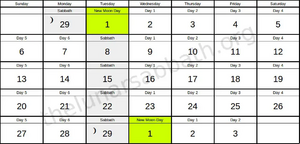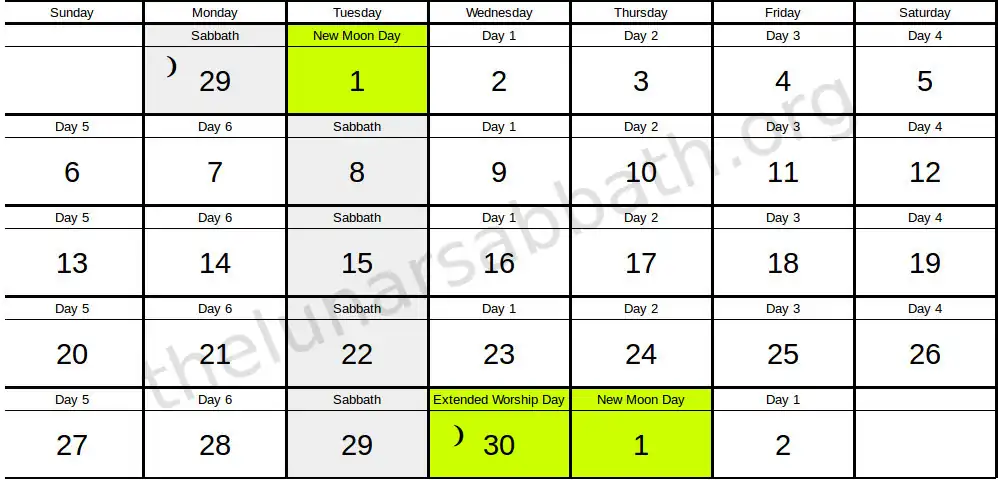Lunar Sabbath Calendar
The Lunar Sabbath Calendar is a Luni-Solar Calendar in which the days of the month and the days of the week are determined by the cycle of the moon.
The first day of the month is the New Moon Day, and the following day will be the first day of the week. This means that the timing of the Sabbath day (the seventh day of the week) will change each month instead of always occurring on a regular seven-day cycle (i.e. on "Saturday"), hence the term "Lunar Sabbath".
The Lunar Sabbath Month
Each month on the Lunar Sabbath Calendar begins with the New Moon Day. The reckoning of this day is done using various methods such as calculating the lunar conjunction or by observation of the crescent moon. The New Moon Day is followed by four weeks that consist of six working days and a Sabbath. This results in the Sabbaths always falling on the 8th, 15th, 22nd and 29th of the month. See this example calendar by clicking on the image:

If the next New Moon Day does not occur after the 29th day, the 30th day is not considered a day of the week but an Extended Worship Day. This will occur about 50% of the time, since the length of a lunar month is approximately 29.5 days.
Rationale
The format of the calendar is based on several doctrinal points:
- Nowhere in Scripture does it ever say that the seven days of the week are continuously repeating without any additional days in between. The week is always described as six working days followed by a Sabbath.[1]
- Ezekiel 46:1 shows that the New Moon Day is not one of the seven days of the week
- Genesis 1:14, Leviticus 23:3 and Psalms 104:19 prove that the weekly Sabbath days are Mo'edim and their timing is determined by the moon
- There are seventy-two Pinpointed Lunar Sabbaths in Scripture which prove that this calendar was in use at that time
Objections
There are a number of objections that have been raised about the validity of this calendar. These include:
- The Counting of the Omer to reckon the timing of Pentecost does not work using this calendar, since counting seven weeks plus a day arrives on a different date than counting fifty days.
- Although most Holy Days do fall on the 15th or 22nd of the month, Abib 21 does not
- Extended Worship Days are never discussed or documented in Scripture
Learn More About Lunar Sabbaths!
References
- ↑ Ex 16:26, Ex 20:9-11; Ex 23:12, Ex 31:15-17, Ex 34:21, Ex 35:2, Lev 23:3, Deut 5:13-14, Eze 46:1
